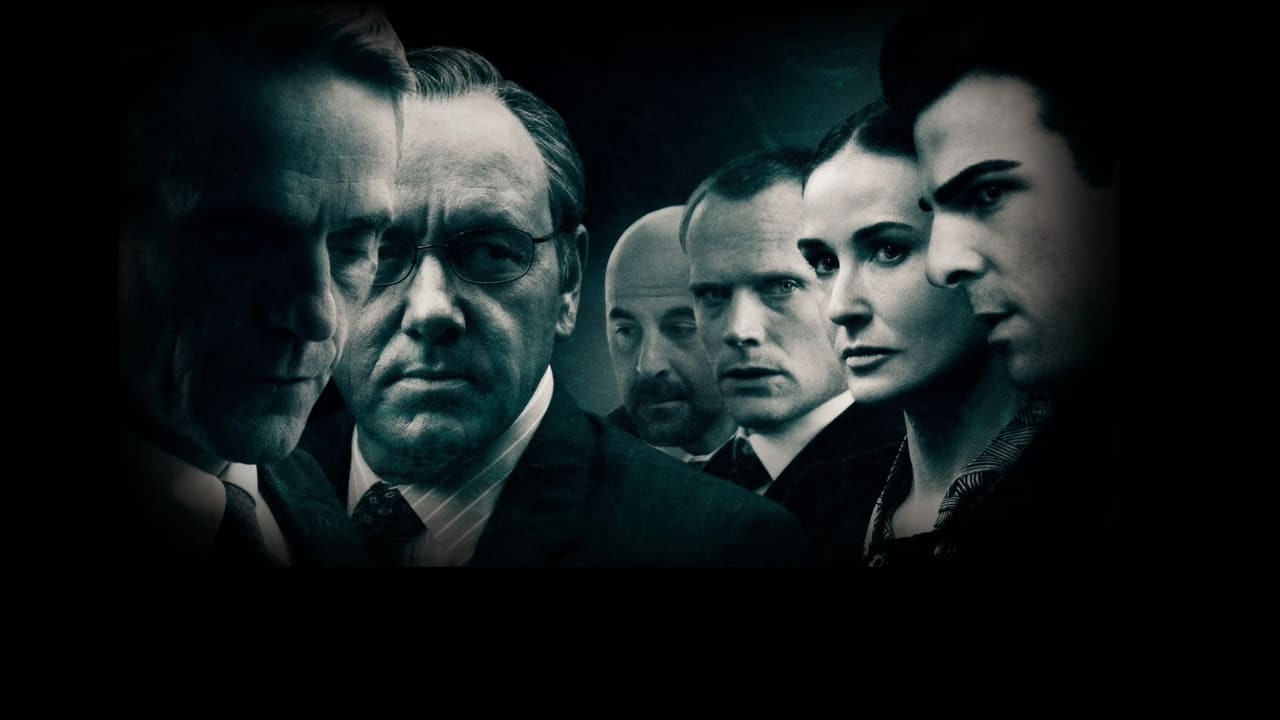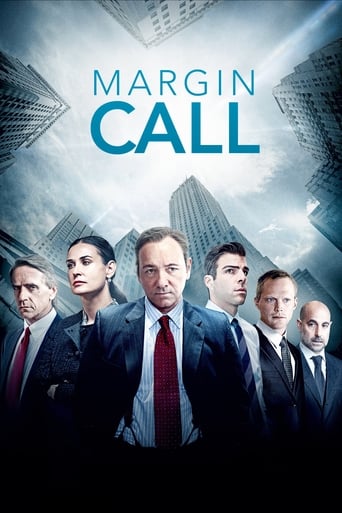BroadcastChic
Excellent, a Must See
Huievest
Instead, you get a movie that's enjoyable enough, but leaves you feeling like it could have been much, much more.
2freensel
I saw this movie before reading any reviews, and I thought it was very funny. I was very surprised to see the overwhelmingly negative reviews this film received from critics.
Sharkflei
Your blood may run cold, but you now find yourself pinioned to the story.
jtom-29387
Many people considered this like a continuation of Wall Street. To me it looks much better, because it has a much more balanced view of the finance industry.The movie was so realistic that it seemed real and made me wonder who the unnamed company was. What was interesting that people from so many different levels were presented, all of them very well paid, all them willing to burn the midnight oil, and all of them trying to do what they thought best for the company.There was no false sentimentalism, their business was to make money. Once they figured out that the ground was shifting under them, they did the logical thing, getting rid of the toxic assets at the first chance. This was their job, not saving the world.So I had more sympathy for the Jeremy Irons character than for the Kevin Spacey characters. All the actors were very good as was the direction and the dialogue. It makes me wonder which company provided the inspiration for the movie. Because of its quality it could have been only Goldman Sacks or Morgan Stanley. Since GS went relatively early out of MBS and since one of the management sacrificial lambs was a woman I think it was Morgan Stanley.
peterquennell
I work in unrelated industries in NYC (first UN, now econ growth) and was blogging on NYC development from 2005 and wrote posts on the fairly obvious growing storm.The film has a beautiful look, pacing, casting, acting, gripping story, what appear to be the main thrusts are all there. But three are not, that I could see, and would have made for an 11 if they were.First, the great underlying crime and real victims. The crime is what the Countrywide Mortgage Company under Angelo Mozilo was up to, extending mortgages initially at low payments to poorer folks, way too many of them Hispanic or Black, and then jacking up the rates after around 5 years, thus causing giant waves of defaults and foreclosures on millions of homes. Treasury Secretary Mnuchin was in this game too. He foreclosed on a 90 year old woman over 27 cents and over 50,000 in total. The toxic sub-prime "paper" that resulted (these mortgages bundled with more highly rated mortgages) was the cancerous cause of the situation seen in the film. Merrill Lynch/Bank of America were forced to buy Countrywide as the cost of their being kept alive; Bear Sterns and Lehman Brothers (the models for this film) had less luck. Google this 2016 article in the New York Times for more. "Countrywide Mortgage Devastation Lingers as Ex-Chief Moves On".Second, it was widely known from 2000 on that the derivatives market was a house of cards. MOZILO HIMSELF SAID SO!! Around 2003. The mentality in the banks was "So what? We are smart enough to be the first out the door."The spark that started the race to get out was the property market flattening out around 2006, as seen by a whole lot of quants (who often did warn the deaf ears higher up.) Third, the regulators were asleep at the wheel. Are they mentioned in the film? It was a bit hard to miss them, they dont work in an ivory tower in Washington. They are embedded in every bank! But they are atoms and the whole gestalt was not being seen.
JRmf
Heavily understated and implied reenactment of one unnamed firm's involvement in the 2008 stockmarket crash. I have had a bit to do with share trading (was never too good at it) so I know the background of what is being discussed and enacted, but many wouldn't I believe. Even "Margin Call" is never discussed or explained, and a trading screen is never seen in close-up.There is a certain tension in the movie, you do sense something big and terrible on a global scale is about to happen, but you never get to actually see it. What you do see is people who would like to do otherwise (like according to conscience) being bought off because of the Almighty Dollar - yeah f#$k, give me a million and I'll write what you like...6/10
NateWatchesCoolMovies
J.C. Chandor's Margin Call sustains a laser focused, wilfully meticulous look at the days leading up to the 2008 financial crash, showing us life within one wall street office building during a nervy period which now no doubt is remembered as the calm before the storm. Various characters in different positions of the hierarchy anxiously brace themselves as the jobs begin to get cut and the dread looms towards them like the inevitable rising sun at dawn. It's set all in one afternoon and night, compacting a far reaching event which spanned years into the microcosm of a single 24 hour window, a tactic which sits through the larger world implications and brings it in for something a little more intimate. Zachary Quinto plays a young trader who discovers a rip in the lining of the economic infrastructure, a precursor to the eventual disaster. I'm not being purposefully vague and cryptic with that, I just don't personally understand all the exact ins and outs of what went wrong back then, and having not the slightest knowledge of wall street jargon, that's the best I can do. He brings this knowledge to his superiors who react in varying ways. Kevin Spacey is a disillusioned big shot who sees his life going off the rails alongside the country's market, and mopes in his swanky office. Paul Bettany is a cocky young upstart who uses casual indifference to shade the bruises he's got from knowing what will happen. Demi Moore is a company head who looks out for herself while others in the company. Jeremy Irons provides scant moments of humour as a bigwig fixer who arrives on a chopper to set things straight, or at least assess the damage. The best work of the film comes from Stanley Tucci (surprise, surprise) as a jilted employee who has been laid off in the confusion, and is seething about it. His melancholic monologue about what it takes to propel America's industry and economy forward resonates with a humanity that cuts deep. The film ticks along with a pace that's both measured and swift, with little time for introspect, yet showing it to us anyway amid the chaos. Watch for appearances from Penn Badgley, Al Sapienza, Simon Baker and Mary McDonnell as well. Chandor let's the proceedings thrum with an inevitability that hangs in the air as the promise of the impending crisis, a feeling that serves to impart not why it happened, not how it happened, but the fact that it did happen, to each and every individual person who was affected, as opposed to the country as a whole.

